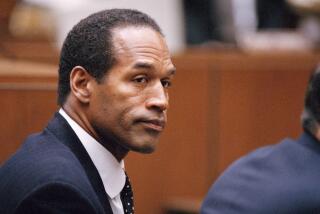The Foot’s in Their Mouths, but It Leaves a Bad Taste in Ours
Thomas Jefferson would have been proud of that pass from Crotty. . . . When Thomas Jefferson was around, basketball was not invented yet, but those slaves working at Thomas Jefferson’s farm, I’m sure they would have made good basketball players.
*
Miami Heat pro basketball radio announcer Dave Halberstam is still trying to explain why he made those remarks during a broadcast a few weeks ago.
His agony began moments after the words went floating out of his mouth. He was fined $2,500 by the NBA and castigated by some players for making an offensive remark. He began apologizing the morning after and hasn’t stopped trying to explain himself since.
Public hangings may be outlawed, but when it comes to racial matters, people who ought to know better somehow keep hanging themselves verbally. In the 10 years since former Dodger executive Al Campanis went on “Nightline” and made racially insensitive remarks about blacks that cost him his job, a parade of others have hanged themselves on the gallows of the public media.
Jimmy “the Greek” Snyder offered his tortured logic for why many fine athletes are black (selective breeding during slavery days). Marge Schott called Hitler an OK guy until he went too far. Compton Mayor Omar Bradley decried producers of rapper Eazy-E’s music as people who would ruin the image of blacks while “having a bar mitzvah at the same time.”
*
In most of these and other cases, the aftermath involved torrents of remorse from the offending utterer and swift punishment by the public. So why, whether they mean it or not, do otherwise sophisticated and media-savvy people keep saying these things?
The problem for many, whether closet racist or not, is the age-old compulsion to explain the world with racial or ethnic generalities that are tolerated in conversation among friends but jarring when shared with a society increasingly sensitive to its diversity.
“They become pop sociologists,” says UCLA sociologist and psychoanalyst Jeffrey Prager. “That’s when these categories become very powerful and meaningful.”
And make for bad pop sociology.
Compton Mayor Bradley admits as much.
“I should have been more specific,” says Bradley, who offered an apology after his 1993 remarks at a Compton City Council meeting at which Eazy-E sought permission to film a video in Compton. “The statement was very sweeping, and it was inappropriate.”
Ask Bradley why he made it, and you witness another familiar facet of these cases: The principals mix their apologies with a controversial explanation of history and society.
“I don’t know if it was racist,” Bradley muses. “I think historically one could prove many of the images about blacks . . . the majority of movies featuring Bojangles, images of us as coons and shines, much of it has been promoted and sponsored by people who happen to be Jewish. . . . But my apology was based on the fact that not all Jews are involved in making these images. . . . It could be they’re just bad producers.”
(Also weighing on him was an admonition from one of his beloved high school teachers, a woman with whom he still chats, a woman who is Jewish. “She said, ‘Omar, why did you say that? Didn’t I teach you better than that?’ ”)
As a politician, Bradley admits, he should have known better. In fact, says USC professor Timur Kuran, it’s a rarity to find a politician these days stumbling over a racial or ethnic land mine.
“Successful politicians go to great lengths to avoid framing things in ways that will offend people,” says Kuran, an economist by training who has written a book about the dichotomy between a person’s public and private face.
Through political instinct or luck, Los Angeles Mayor Richard Riordan seemed just to skirt the edge of that land mine a few months ago when he rambled to a reporter about how most of the waiters at his downtown restaurant, the Pantry, were Latino:
“I don’t know the reason and I hesitate to guess, but it’s true to a great extent throughout the city. [Waiters] tend to be more Latino. I think a lot of groups [like] Filipinos become doctors and nurses.”
He also talked about African Americans leaving behind slavery a little more than a century ago. “Maybe in the history of the world you can’t expect them to have gotten where other cultures have gotten over many centuries. But that doesn’t mean you give up. You have to fight, fight, fight to give them the tools to compete.”
The mayor’s pronouncements seemed to fall so hazily between simple observation and social conclusion that the only sharp rebuke he drew was from his then-mayoral opponent, Tom Hayden.
*
Often when public figures stumble, it’s because they’ve misjudged their audience.
“People have different publics,” says USC assistant professor of sociology Darnell Hunt. “Some people will be scorned by the general public, and then they have a public close to them that will support them. . . . People may feel when they speak these things, they are in a friendly environment.”
Halberstam’s problem was simpler: He tried to be flippant and collided with society’s hair-trigger sensitivity to verbal impropriety.
Looking back, he can chart his descent into trouble starting from an innocuous remark he made earlier in the March 19 game about Miami Heat point guard John Crotty.
“Before that pass, I said he went to [the University of] Virginia--which was founded by Jefferson,” says Halberstam, 45, who is proud of his breezy, irreverent play-by-play that includes funny, unrelated pieces of information about the players.
“From there, he made that gorgeous pass and I said, ‘Thomas Jefferson would have been proud.’ Oh! I wish I had just stopped there. Who knows what was really going through my mind? You’re going so fast when you’re broadcasting. I guess I was trying to be cute. . . . You pick up any biography of Thomas Jefferson, and the first thing you read is he’s known for all those slaves.”
Halberstam is a white man who prides himself on ethnic and racial sophistication. His father is an Auschwitz survivor. His sister-in-law is black. His former broadcast jobs include work at a predominantly black New York City college. He studiously avoids what he considers subtle racist remarks--like praising black players for being articulate. It may have been his own hypersensitivity to racial issues--not the fact he was watching black basketball players--that made him free-associate Jefferson with the fact that the president owned slaves. (After all, Crotty--the player who started Halberstam down the slippery slope toward slavery--is white.)
“What I really meant to say was that if slaves had had the opportunities that they were denied, they would have been good lawyers, doctors and whatever else. Basketball just came to mind,” Halberstam told a reporter in the days after the game.
By itself, that explanation sounds lame. Given the context of Halberstam’s life experience, it makes a certain sense.
*
Complicating most of these cases is the fact that some people get caught in time warps between what you could say before and what you can say now.
“Racial etiquette changes over time,” says USC’s Hunt. “People speak because they feel they can speak that way.”
Snyder found out firsthand how much etiquette had changed in 1988 after opining in a casual television interview over lunch in Washington, D.C.: “The black is a better athlete to begin with because he has been bred to be that way. This goes all the way back to the Civil War, when the slave owner would breed his big black to his big woman so that he could have a big black kid, see.”
The remarks cost the oddsmaker and sports commentator his job and, reportedly, his peace of mind. The Greek, who died a year ago at 77, was haunted for much of his last years by the notion that those words were all anyone would remember about him.
“That sounds like gross biological racism,” says UCLA sociologist Prager of the Greek’s remarks. “What we have abandoned is that biological or inherited differences by race can explain social phenomena. But we haven’t abandoned the notion that different cultural differences are due to race.”
So the Greek’s crime may have been biological racism, but Campanis, Prager surmises, was just guilty of being “a bad sociologist.”
Campanis told “Nightline’s” Ted Koppel that he thought there were few blacks in baseball management because “they may not have some of the necessities to be, let’s say, a field manager or, perhaps a general manager.” And he added, “Why are blacks not good swimmers? Because they don’t have the buoyancy.”
That theory about black people’s lack of buoyancy stemmed from Campanis’ World War II-era experiences watching black Navy recruits sink during dives into pools, his son George has said. As for his theories about management, his son contends Campanis was thinking of “experience” when he talked about “necessities.”
Proving how fuzzy this area is, even as Campanis has remained publicly condemned for his comments, he has retained a group of fiercely loyal friends--including several black baseball players--who continue to defend him. After all, the reason Campanis was on “Nightline” that fateful day was to commemorate the 40th anniversary of Jackie Robinson breaking the color barrier in baseball. “I don’t believe he has a prejudiced bone in his body,” Don Newcombe, one of the early black baseball players, told a reporter recently.
“Race relations in the U.S. constitutes a very, very sensitive subject,” says USC professor Kuran. “There are a lot of other topics where people can say things tremendously hurtful, but they will not generate great attention from the media.”
*
Some public offenders think they have simply been caught being harmlessly clumsy at a time of unprecedented public racial and ethnic sensitivity.
When KCBS broadcaster Michael Tuck read a script one night that had glaring grammatical errors, he said angrily during the commercial break that it was the work of someone who learned English as a second language. His remarks were never aired, but he later issued an apology and the station had all employees attend diversity training workshops.
The woman who wrote the script was a bilingual Latina who had come from Spanish-language television.
She no longer works for the station.
“I did have something to apologize for--the clumsy way that I worded something, knowing that people are quite sensitive on this issue,” says Tuck, who read the offending script cold. “When I say ‘second language’ I’m talking about the language you are not the most proficient in. And I don’t feel that she knew the English language best.”
If he could say it over, what would he say?
“Nothing!” he exclaims in anguish.
More to Read
Go beyond the scoreboard
Get the latest on L.A.'s teams in the daily Sports Report newsletter.
You may occasionally receive promotional content from the Los Angeles Times.











